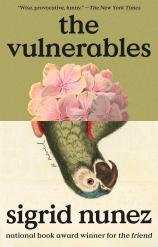The Vulnerables
Review
The Vulnerables
On the first page of Sigrid Nunez’s new novel, her unnamed narrator remarks on a phenomenon experienced by every avid reader --- the inability to remember a plot detail from a book read long ago. Her narrator continues:
“Not that it mattered. Only when I was young did I believe that it was important to remember what happened in every novel I read. Now I know the truth: what matters is what you experience while reading, the states of feeling that the story evokes, the questions that rise to your mind, rather than the fictional events described.”
It’s Nunez’s recognition of that wisdom that makes THE VULNERABLES so enjoyable. Set mainly during the early days of the COVID-19 pandemic, it shares some welcome stylistic similarities with its immediate predecessors --- THE FRIEND, which won Nunez the National Book Award in 2018, and WHAT ARE YOU GOING THROUGH --- but in her case, more of the same (or at least similar) is never too much. It’s compact, filled with allusions to the work of a panoply of writers, and dependent for its appeal on the thoughtful, often wry voice of its highly intelligent narrator.
"[THE VULNERABLES is] compact, filled with allusions to the work of a panoply of writers, and dependent for its appeal on the thoughtful, often wry voice of its highly intelligent narrator."
Like Nunez, that narrator is a writer and retired writing teacher who lives in New York City. These are just two of the facts that inevitably will cause some readers to wonder if the novel is a work of autofiction, reminiscent of those of Karl Ove Knausgård or Annie Ernaux.
It’s a question that Nunez has faced before, and in a recent Q&A in Vanity Fair, she protested it, albeit somewhat ambiguously: “I have never been interested in writing fiction that was strictly autobiographical, or autofiction.” But even as she says, “There are far more imaginary than true-life stories in my novels,” she admits, “they are still --- every word of them --- about me.”
In this case, after the narrator returns from the funeral of a friend who died suddenly to a “stricken city” now in lockdown, she finds herself caring for a miniature macaw named Eureka. He’s owned by Iris, a writer who’s the client of her friend Violet, a book editor, and who’s pregnant and stranded in California. After the young NYU dropout who’s been tending the bird for her suddenly abandons the job, the narrator assumes the task. At first, she does that from her own apartment. But after she offers her place to a pulmonologist who’s come to New York to respond to the medical crisis, she takes up residence with Eureka, who’s “[o]ne of those breeds famous for being able to mimic speech,” but, according to her owner, “not much of a talker.”
The novel contains charming scenes of Eureka’s life in his parrot paradise. A companionable bond forms between him and the narrator as the latter fashions a tolerable existence at ground zero of the pandemic. She spends hours reading the news and taking long walks that make her feel “guilty about the pleasure I took in the lifeless streets.”
Eventually, though, the student --- who the narrator nicknames “Vetch” (Nunez gives all of her characters the names of flowers or plants) --- returns unannounced. His parents have kicked him out of their Tribeca apartment; as Iris explains, “the truth is, he’s always been a big problem for them,” not least because of his mental health issues. At first, his presence is a source of friction, but with time, the pair --- separated by several decades of age and decidedly different perspectives on life --- warm to each other in surprising and even hilariously charming ways.
But as in Nunez’s other recent works, it’s not this relatively sparse plot that provides most of the novel’s pleasure. The narrator, who feels like she’s been “mourning all my life,” reflects with keen insight and wit on subjects that include her own childhood, relations between the sexes, the nature of truth in storytelling (epitomized in a dissection of Joan Didion’s famed essay, “Slouching Towards Bethlehem”), the film My Octopus Teacher, and even people’s dreams, not least her own, about Donald Trump. “For the writer,” she observes, “obsessive rumination is a must. Imagination must follow dark thoughts to dark places, you can’t ever just say, Stop, don’t go there.” The novel ambles along with such seamless ease that we’re willing to follow her down any of these paths, and others equally quirky and fascinating, no matter how discursive it may seem.
It's writing, and the life and mind of the writer, that’s at the heart of this consistently entertaining novel. That’s a subject that preoccupies the narrator and likely Nunez herself. “What writer wants to look back and think, I wrote too much? But probably true of most. How often reading the latest offering by some well-established novelist have I thought, It’s terrible, what happens to writers.” If she continues to produce novels as engaging as THE VULNERABLES, she has nothing to worry about on that score.
Reviewed by Harvey Freedenberg on December 1, 2023
The Vulnerables
- Publication Date: November 5, 2024
- Genres: Fiction, Women's Fiction
- Paperback: 272 pages
- Publisher: Riverhead Books
- ISBN-10: 0593715527
- ISBN-13: 9780593715529




